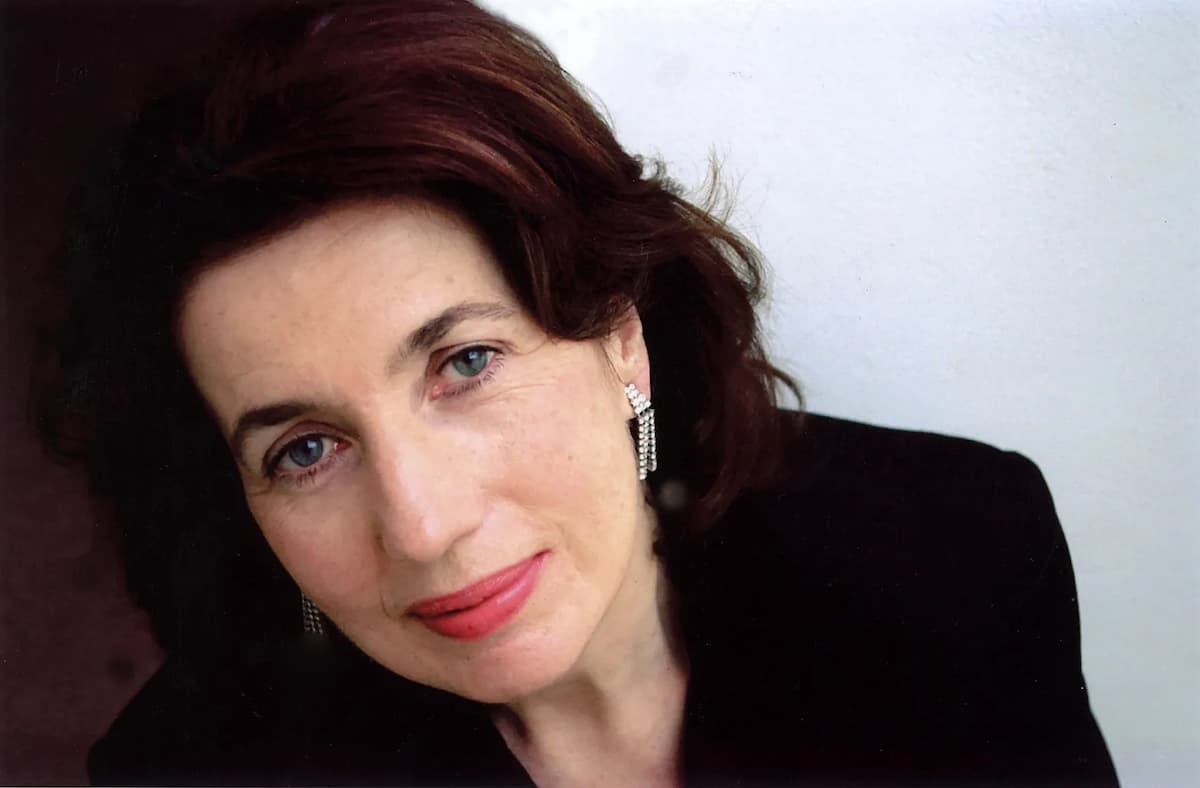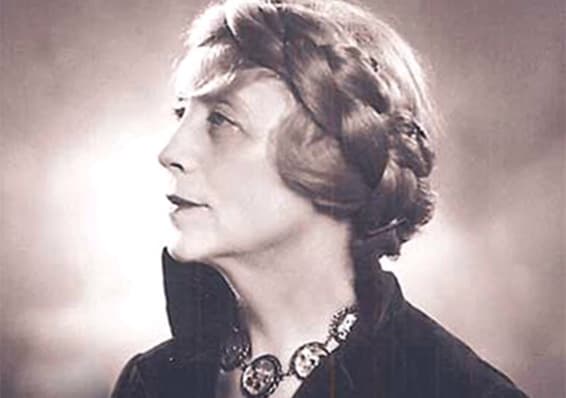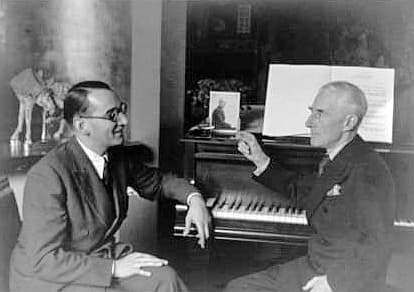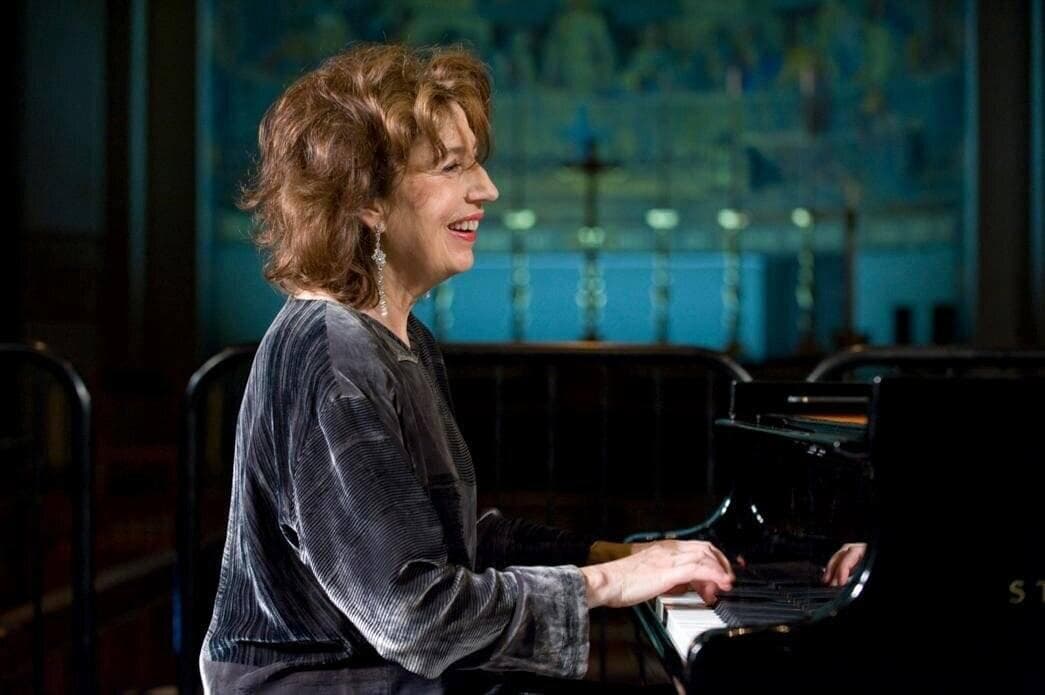Sir Simon Rattle famously wrote, “Imogen Cooper is one of the greatest musicians England has produced. She’s utterly without show. Mozart, Schumann and Schubert could have been written for her. There’s a poetic, reflective side to her which is always there in her playing.” While Cooper is internationally admired for her lucid, sensitive interpretations of Mozart, Schubert, and Schumann, she has recently been involved with contemporary music as well. Cooper was awarded the Queen’s Medal for Music in 2019.
Imogen Cooper Performs Schumann’s Novelette Op. 21, No. 2
Growing Up

Imogen Cooper
Imogen Cooper was born in North London on 28 August 1949 as the youngest of four children to Martin Copper, a critic and musicologist, and Mary Steward, an amateur pianist and artist. She was surrounded by music growing up and loved to climb up on the piano stool and experiment. As she remembers, “As a three-year-old, one of my favourite games was to sit under the piano and have my parents play hideously discordant harmonies so that I could tell them all the notes.”
At the age of five, Imogen announced that she wanted to be a concert pianist, much to the delight of her father. He likened the learning of string instruments to the process of killing a pig, so the family produced two pianists, an oboist and a clarinettist. As she recalled in an interview, “I am fortunately the only one to have stuck with it.”
Wolfgang Amadeus Mozart: Piano Concerto No. 23 in A Major, K. 488 (Imogen Cooper, piano; Northern Sinfonia)
Paris or Moscow

Yvonne Lefébure
At age 12, Imogen was still determined to become a concert pianist, so her parents decided that she must go either to Paris or to Moscow. Moscow was too remote, “so I went to Paris alone to study with Jacques Février and Yvonne Lefébure while they stayed at home with the rest of the family. It was an unconventional decision and caused a furore in the English musical establishment.”
For much of the British music establishment, this was a rather provocative move. In fact, it led to a lengthy correspondence in The Times between Thomas Armstrong, Principal of the Royal Academy of Music in London, and Martin Copper. They publicly debated the pros and cons of taking a gifted child out of conventional education to specialise so early and in a foreign country.
Imogen Cooper Performs Schubert’s Sonatas
Far Away from Home

Jacques Février and Maurice Ravel, 1937
Martin Cooper argued that there were no available top specialist music schools in the UK at that time, “so the real choice was to be found abroad.” Simon Rattle commented, “She’d been sent away to study in France very early – which, of course, is why she plays so well, but I think that maybe she was sent away too young. She missed out on a lot of ordinary growing up. That, and what I imagine must have been a great weight of Catholicism in the family, was quite a burden for such a serious young girl.”
Imogen auditioned for Jacques Février, the great French pianist and close personal friend of Ravel and Poulenc, at the age of 11. According to Cooper, he told her parents, “she has a lot to learn, but she already has what I cannot teach her.” She lived in a hostel and was taken to the Conservatoire every day by nuns. Battling homesickness, she wrote tearful letters to her parents every day.
Ludwig van Beethoven: 33 Variations on a Waltz by Diabelli in C Major, Op. 120, “Diabelli Variations” (Imogen Cooper, piano)
Paris Conservatoire

Dame Imogen Cooper
Cooper loved her main teachers, Février and Lefébure, but other teachers were decidedly tough on her. She recalled in an interview that “one of them used to slap my hands down on the keyboard when I made a mistake, and another described her piano playing as soft like a tap of tepid water.” She did go back to London on holidays, and insists that she never regretted her time in Paris. “It was what I wanted to do.”
Six years later, the Conservatoire awarded her a Premier Prix de Piano, and back in London, she played for Arthur Rubinstein and Clifford Curzon, and she heard Alfred Brendel playing Schubert and Chopin at the Austrian Institute, and the rest is history. Cooper has mixed feelings about her youth, and she admitted that her experiences in Paris led to a later spell of psychotherapy. “I felt that I’d missed out on being a teenager.” However, she also acknowledges that her time in Paris prepared her for tough days ahead. “The life of a solo pianist is a dysfunctional one,” she explained, “and carries the risk of making the lives of people around you dysfunctional too.”
For more of the best in classical music, sign up for our E-Newsletter
